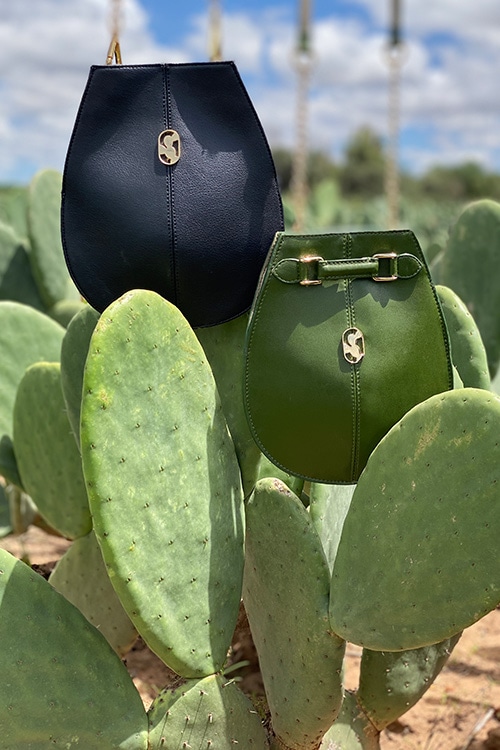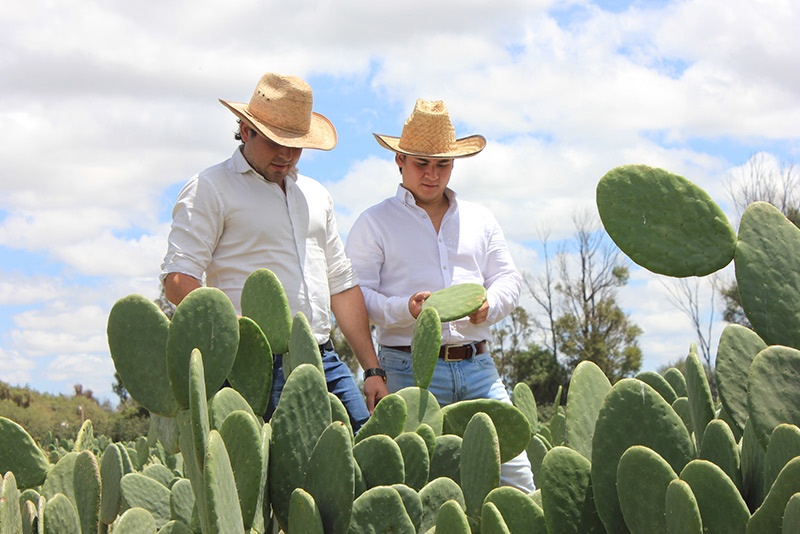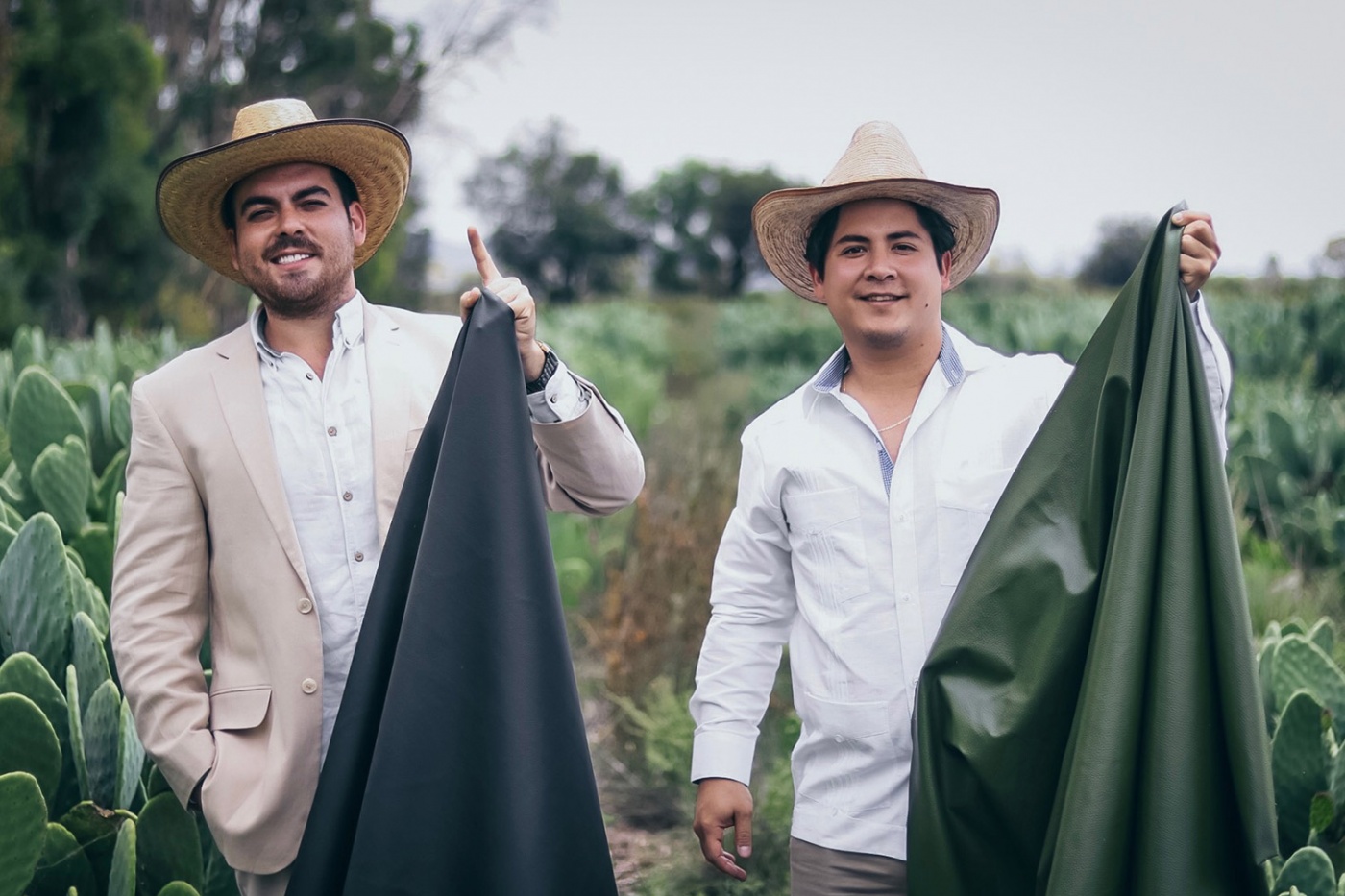Meet Desserto, the Company Changing the Future of Leather
The world has been in a pandemic mode for over a year, but with that comes the opportunity to build (back) a better world—one that is greener. Although Covid-19 lockdowns have accelerated job losses, the screeching pause has increased people’s consciousness around climate change and sustainability. Somewhere in Zacatecas, two Mexican entrepreneurs, Adrián López Velarde and Marte Cázarez are trailblazers in this endeavour—having found an ethical and non-toxic alternative to animal leather.
Made from nopal (cactus), Desserto has all the characteristics (texture, appearance and softness) of verisimilitude, while still adhering to the most rigorous quality and environmental standards. According to Infinium Global Research, the global market for vegan leather is estimated to be worth US$89.6 billion by 2025, and it is only a matter of time before the fashion, furniture and automotive industries sink their teeth into this innovative textile. Here, we speak to Adrian and Marte about why sustainability needs to be at the forefront of every company.
High Net Worth: How and why did you come up with the idea to create cactus-based leather?
Adrián López Velarde and Marte Cázarez: We met in 2011 in Taiwan and became great friends—coincidentally it turned out that we were born the same day, month, and year too! After a few years, we got back in touch in Guadalajara City, where our company ADRIANO DI MARTI SA DE CV is now based. At that time, we were working in the fashion and automotive industries and had a common concern, which was the environmental impact caused by animal and synthetic leather. So after brainstorming, we decided to leave our jobs and focus on developing Desserto, a cactus-based material as an alternative to leather.
If you had to choose three words to define your brand, what would they be?
Sustainability, balance, and performance.
Tell us more about the new automotive material line, DESERTTEX, that you plan to introduce to the market.
Deserttex is an automotive exclusive material that has been introduced to several OEMs around the world and we are incredibly grateful to receive positive feedback about it. We wanted our materials to be an option for car interiors with the objective of offering supreme quality with a great sustainable advantage.
You also introduced your first-ever cactus leather boxing gloves. What attracted you to collaborate with Sanabul, a martial arts equipment and apparel brand?
In Mexico, boxing is an extremely popular sport. Personally, we are big fans of martial arts, and seeing athletes wearing cactus-based sports products is exciting as well as inspiring that sports and sustainability can go together.
How does Desserto reflect your other personal practices?
Desserto has been a blessing for us. The feeling of waking up every day to help brands achieve their sustainability goals while generating well-being is joyful and exciting.

What do you hope people get out of wearing or using your material?
Quality, innovation and contributing to a better world.
In your opinion, is sustainable fashion really sustainable?
Like in any industry, there are two sides to the coin, but what we know is that there is a genuine interest in the fashion industry: brands who are interested in doing things differently, to make a transition towards sustainability. Change is never easy, but fashion has always been characterised for its creativity, will, and enthusiasm—such characteristics that will make the transition toward sustainability possible. Now we hope that we can inspire others to follow.
You won the prize for sustainability at the Monte Carlo Fashion Week (2020) and you were the first runner-up for last year’s LVMH Innovation Awards. What makes a brand truly sustainable?
From our perspective, what makes a brand truly sustainable is that all the people involved are paid fairly, work in safe conditions, that processes and formulations are kept as low as possible with regard to carbon dioxide emissions, water, and chemical usage. To be socially responsible also means preserving biodiversity and animal welfare.
Where does fast fashion fit in this equation?
In our opinion, fast fashion still plays a critical role. The global population is growing, and this means that there will be more people needing clothes, footwear and jobs. However, these companies have the opportunity to become fully sustainable and generate value too.

You spent two years of research and development before launching Desserto. What were some of the biggest challenges that you faced along the way, and how did you circumvent them?
It was mentally and economically challenging. Many sacrifices had to be made, but every time we saw progress on our developments, we became more confident that we were heading in the right direction. We are grateful for every person that has contributed to making Desserto a reality.
Has Covid-19 impacted your business in any way or changed your approach to entrepreneurship?
Our company ADRIANO DI MARTI was practically born during the pandemic as we launched our materials in October 2019 in Milan, Italy. This was shortly after the whole world got affected by Covid-19. We know that the global economy has slowed down in many sectors, but in others, it has been growing too. Covid-19 is a reminder that we must do things differently, and that global teamwork, collaborations and responsible innovations are necessary.
It has been predicted that the vegan leather industry will be worth $85 billion by 2025. How do you think Desserto will be a part of that growth?
ADRIANO DI MARTI has been growing exponentially since our launch, thanks to the acceptance of our material throughout the world. We are confident growth will keep happening as we take on more projects.
Some people regard Mexico as the cradle of vegan entrepreneurship. Why do you think there has been such a phenomenon there?
The average age in Mexico is 29—that’s both our ages! We realise that people our age are more conscious of environmental care and personal well-being more than ever before. Perhaps that’s why vegan entrepreneurship is booming.


